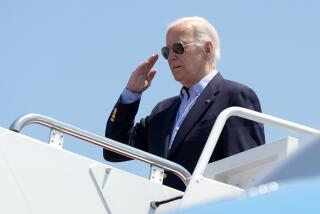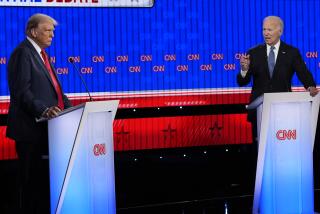Raising debt limit: Treasury’s Lew warns Congress it’s risky to delay
WASHINGTON -- As the nation fast approaches its debt limit, Treasury Secretary Jacob J. Lew on Tuesday issued his strongest warning yet to Congress about the economic consequences of waiting until just before the deadline to pass an increase.
“Trying to time a debt limit increase to the last minute could be very dangerous,” Lew told the Economic Club of Washington. “We cannot afford for Congress to gamble with the full faith and credit of the United States of America.”
Republicans are balking at raising the $16.7-trillion debt limit -- which Congress must do by as early as mid-October -- unless the Obama administration agrees to major concessions including deep spending cuts and a delay in implementing the healthcare reform law.
QUIZ: Test your knowledge about the debt limit
During a meeting last week, House Speaker John Boehner (R-Ohio) gave Lew a list of times in the past when the White House and Congress used the need to raise the debt limit as a way to find bipartisan solutions on fiscal issues, Boehner’s office said.
Boehner has said that any increase in the debt limit must be offset by budget cuts or spending reforms at least as large as the increase.
But Lew reiterated Tuesday that Obama would not negotiate over raising the debt limit because it involves paying for bills already authorized by Congress and the notion of a federal government default should not be a bargaining chip.
Lew specifically ruled out a delay in the Affordable Care Act, a move being pushed by some House conservatives.
“That’s just not reality, and they’re going to have to start dealing in reality,” he said.
But as the Treasury runs out of the accounting maneuvers it has used since the spring to continue borrowing to pay the nation’s bills, Lew said lawmakers needed to act.
The U.S. technically reached its debt limit in the spring, but the Treasury has been using so-called “extraordinary measures,” such as suspending investments in some federal pension funds, to juggle the nation’s finances in order to keep borrowing to pay bills. Those measures will be exhausted by the middle of October.
Lew noted that Washington politicians often wait until they are up against a deadline to act, as they did last year with the fiscal cliff and often do with spending bills.
But the debt limit is different, Lew said, because of the complexity of identifying an exact date when the nation would run out of borrowing authority -- and because of the consequences of a first-ever federal government default.
Lew said a default would be “a self-inflicted wound that can do harm to our economy right at a moment when the recovery is strengthening.”
A bitter battle over the debt limit in 2011, resolved at the last minute, raised fears of a first-ever U.S. government default. The lengthy standoff led Standard & Poor’s to downgrade the nation’s credit rating for the first time and triggered financial market turmoil along with a deep drop in consumer confidence.
“Some in Congress seem to think they can keep us from failing to pay our nation’s bills by simply raising the debt ceiling right before the moment our cash balance is depleted,” Lew said. Such a view is “misguided,” he said.
The Treasury Department doesn’t know with precision the exact day when it won’t have enough incoming cash to make all the required outgoing payments once it runs out of borrowing authority.
Lew formally told Congress last month that the Treasury would run out of borrowing authority in mid-October. At that point, the government would be able to pay bills only with cash on hand of about $50 billion on any given day.
An analysis released last week by the Bipartisan Policy Center, which also cited the difficulty of pegging an exact date, estimated the U.S. would run out of borrowing authority between Oct. 18 and Nov. 5.
The vagaries of the debt limit issue mean Congress must act sooner rather than later, Lew said.
“I’m nervous about the desire to drive this to the last minute when the last minute is inherently unknowable and the risk of making a mistake could be catastrophic,” he said.
ALSO:
Whoever’s chosen, Fed chair stays a hot seat
Several banks considered too big to fail are even bigger
JPMorgan could pay $800 million in penalties in ‘London Whale’ case
More to Read
Inside the business of entertainment
The Wide Shot brings you news, analysis and insights on everything from streaming wars to production — and what it all means for the future.
You may occasionally receive promotional content from the Los Angeles Times.











